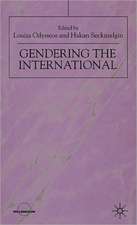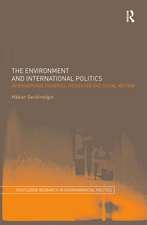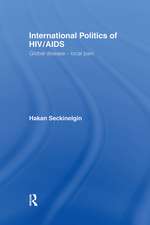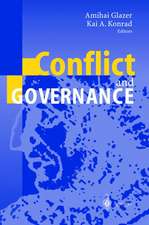The Politics of Global AIDS: Institutionalization of Solidarity, Exclusion of Context: Social Aspects of HIV, cartea 3
Autor Hakan Seckinelginen Limba Engleză Hardback – 13 oct 2016
| Toate formatele și edițiile | Preț | Express |
|---|---|---|
| Paperback (1) | 691.91 lei 43-57 zile | |
| Springer International Publishing – 16 iun 2018 | 691.91 lei 43-57 zile | |
| Hardback (1) | 698.15 lei 43-57 zile | |
| Springer International Publishing – 13 oct 2016 | 698.15 lei 43-57 zile |
Preț: 698.15 lei
Preț vechi: 821.35 lei
-15% Nou
Puncte Express: 1047
Preț estimativ în valută:
133.63€ • 145.20$ • 112.32£
133.63€ • 145.20$ • 112.32£
Carte tipărită la comandă
Livrare economică 21 aprilie-05 mai
Preluare comenzi: 021 569.72.76
Specificații
ISBN-13: 9783319460116
ISBN-10: 3319460110
Pagini: 200
Ilustrații: XVIII, 176 p.
Dimensiuni: 155 x 235 x 13 mm
Greutate: 0.45 kg
Ediția:1st ed. 2017
Editura: Springer International Publishing
Colecția Springer
Seria Social Aspects of HIV
Locul publicării:Cham, Switzerland
ISBN-10: 3319460110
Pagini: 200
Ilustrații: XVIII, 176 p.
Dimensiuni: 155 x 235 x 13 mm
Greutate: 0.45 kg
Ediția:1st ed. 2017
Editura: Springer International Publishing
Colecția Springer
Seria Social Aspects of HIV
Locul publicării:Cham, Switzerland
Cuprins
Preface.- Chapter 1 Introduction.- Chapter 2 Pathways to the politics of Global AIDS and the meanings of AIDS.- Chapter 3 Institutionalization of Global AIDS and the creation of the Joint United Nations Programme on HIV/AIDS (UNAIDS).- Chapter 4 Civil Society and Solidarity in the politics of Global AIDS.- Chapter 5 Global AIDS and the Politics of Knowledge.- Chapter 6 Evidence-based Policy: Randomized Controlled Trials’ Knowledge Claims to AIDS Policy.- Chapter 7 Context Matters! But Why?.- Chapter 8 Conclusion: Emergency, Sustainability and Success.
Textul de pe ultima copertă
This timely book looks critically at the policy response to AIDS and its institutionalization over time. It raises important questions about who benefits, who decides, and in whose interests decisions are made. Taking the early international response to the epidemic as its starting point, and focusing on the work of agencies such as UNAIDS, it identifies two logics underpinning strategy to date. First, the idea of HIV as a ‘global emergency’ which calls for an extraordinary response. Second, the claim that medicine offers the best way of dealing with it. The book also identified the rise of something more dominant – namely Global AIDS – or the logic and system that seeks to displace all others. Promulgated by UNAIDS and its partner agencies, Global AIDS claims to speak the truth on behalf of affected persons and communities everywhere. Founded on solidarity claims concerning the international HIV movement, and distinctive knowledge practiceswhich determine what needs to be done. Alternative views about the nature of the epidemic or the best response are rejected as irrelevant for falling outside the master framing of the epidemic that Global AIDS provides. But to what extent is this biomedical and emergency framing of the epidemic sustainable, and to what extent does it speak to the sustainability of lives as affected people wish them to be lived? Does scientific and biomedical advance provide all the answers, or do important social and political issues need to be addressed? This book provides an innovative framework with which to think about these and other sustainability challenges for the future.
Caracteristici
Develops a new conceptual framework for understanding the international policy response to HIV Provides in-depth critical analysis of the role and impact of key international organizations in the HIV epidemic so far Offers an innovative analysis based on ongoing research in multi-country contexts Links the global and the local in thinking about HIV





























